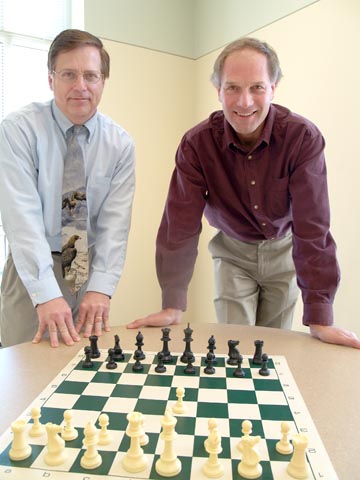| |
|
|

from the issue of November 30, 2006
|

| |
|
|
| |
Educational Psychology class aimed at jump starting youth chess clubs

Husker Chess

BY TROY FEDDERSON, UNIVERSITY COMMUNICATIONS
Chess education is going active at UNL.

| | 
 
| | | COURSE CREATORS - Thomas O'Connor (left) and Ken Kiewra will teach a new course aimed at expanding chess education for elementary school students. The class begins in the spring semester. Photo by Troy Fedderson/University Communications.

|
Inspired by a June presentation by a national chess icon, UNL's Kenneth Kiewra and Thomas O'Connor - both students of the game - have developed a new educational psychology course, Teaching Chess in Schools. The class, offered for the first time in the spring, is intended to show anyone how to teach chess to elementary school students (kindergarten to sixth grade).

"The class is designed to prepare individuals to instruct scholastic chess clubs," said Kiewra, a professor of educational psychology. "It's not only for teachers. It's for graduate students, undergraduate students, parents and school volunteers. Anyone interested in promoting chess in schools."

The game has long held an interest for the two UNL educators.

Both are officers in the Lincoln Chess Foundation, a group that promotes chess in schools across Nebraska.

O'Connor - known as "Dr. Chess" in the Lincoln Chess Foundation - grew up playing chess with his siblings.

"When I was in high school, Bobby Fischer came up on the international chess scene," said O'Connor, a coordinator in the College of Business Administration. "That caused chess clubs to start springing up. I've been involved ever since."

O'Connor continues to play and has a Class-A rating. He has taught the game to students at six elementary schools in Lincoln. One of his students is Kiewra's son, Keaton, a six-time national scholastic chess title winner who is attending the University of Texas at Dallas on a chess scholarship.

"I became involved with chess through my son," Kiewra said. "He has a real affinity for games and strategy, so I decided to teach him how to play. I picked up a few books, we started and he latched onto it."

Like O'Connor, Kiewra also teaches chess at Lincoln schools.

Through their work with chess clubs and in competitions (ranging from local to national tournaments), the two have a first-hand knowledge of the benefits of the game.

"We've found that kids really enjoy playing chess," O'Connor said. "And, the research is overwhelming, particularly for grades four to six, that participating in a chess program dramatically improves reading, math and social skills.

"It's just a great learning tool."

An example of the effects of chess came to Lincoln in June. During the Lincoln Chess Foundation camp, David MacNaulty, an English teacher from New York offered the presentation, "Why Chess Belongs in Schools."

MacNaulty is a long-time teacher of the game. However, he rose to chess stardom by guiding a group of underprivileged fifth-graders from the South Bronx to a national championship.

"That group of kids won a national championship, but they also learned that they had options in life," said Joan Jacobs, supervisor of the Lincoln Public Schools gifted program. "Instead of just following options that they saw others follow in their neighborhood, these kids learned to analyze situations."
In the Bronx school district where only a small percentage of students went on to college, each male in MacNaulty's team of national champions graduated high school and attended a university.

"This class we are planning evolved from that presentation by MacNaulty," Kiewra said. "We decided we needed a way to get chess started in schools. To do that we have to train people how to play."

While a handful of Lincoln Public Schools have chess clubs, the district has mingled some chess lessons into the math curriculum.

Jacobs said that, while difficult in terms of time and money, an expansion of chess programs in the schools would be beneficial.

"I think this class is a very good idea," Jacobs said. "Learning how to play chess is one of those skills that has positive impacts in all other areas of study."

Kiewra said the class will provide an overview of the game - starting with the most basic elements - and work toward an advanced understanding of chess. Individuals who complete the course will be able to work with students up to sixth grade.

"This class is pretty experimental. At this point, we don't envision a more advanced class," O'Connor said. "Our goal is to get these people excited about chess, get them to start working with students and naturally, learn more on their own."

For more information on the course (listed as Educational Psychology 498B-101 and 987B), contact Kiewra at kkiewra1@unl.edu or 472-3233, or O'Connor at tjoconno@gmail.com or 472-0733.
GO TO: ISSUE OF NOVEMBER 30
NEWS HEADLINES FOR NOVEMBER 30
Husker Chess
Campus closures go digital
First Gen-Ed proposals sent to colleges
Osborne returns to classroom
Class earns hands on experience
Foxes enlisted to protect evergreens
Hollestelle retrospective opens Dec. 1 at Morrill Hall
Scientists urged to 'dream big,' collaborate
UNLPD seek information on City Campus vandalism
732645S36473X
|
|
|
|
|
|
|
|